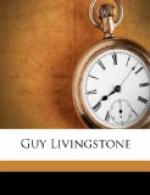“If I were to strangle him,” he said, “as I constantly feel tempted to do, I believe I should deserve well of the state. But, with all that, I don’t like plotting against him under my own roof; it strikes me that is a phase of hospitality not strictly Arabian. My mother laments over him already as hardly dealt with. Then Uncle Henry is a great difficulty. He is not in the least one of the light comedy fathers who, during two acts, stamps about with many strange oaths and stormy denials, but in the last yields to fate and soubrettes, says ‘Bless you, my children!’ and hands out untold gold. There is no more appeal from his decisions than from Major A——’s. He dislikes Bruce, of course; but he would just as soon think of objecting to a partner at whist as to a son-in-law because he happened to be unprepossessing. When the poor little Iphigenia is sacrificed on the shrine of expediency, you will see him, not veiling his face but taking snuff with the calm grace that is peculiar to him. Arguing with such a man is a simple absurdity.”
“I can not advise you,” I answered, sadly; “but it seems hard on Miss Raymond, too.”
“Of course it is,” Livingstone broke in; “and the worst of it is, the poor child looks to me to help her. I can’t bear to think of what her life would be if she married Bruce. He would be constantly retaliating on her for what he is suffering now—for he does suffer. A pleasant idea that she, who is only meant to be petted, should be set up as a target for his jealousy and ill-humor! She would never be able to stand it, and Charley wouldn’t if she could; and then there would be a denouement like that which ruined Ralph Mohun. If there is to be a row, it had better come before than after marriage. It’s more moral, and saves an infinity of trouble. I think Charley is better away, too, just now. Parndon wants us both to stay with him. We’ll go; and so my conscience will stand at ease for the present. When we are on neutral ground I can help them, or, at all events, ‘let the justice of the king pass by.’”
“Have you spoken to Forrester yet?”
“No; but he will do as I advise, and temporize, I am sure, though he would hardly give up Bella, even if I asked him. He means business for once, evidently. They will have plenty of time to concert their plans before the summer. Charley wants no help in that. As to carrying them out—we shall see. Well, you will go to-morrow. I am very sorry, for all reasons. I hope you have not been much bored here. Kerton counts on you for next winter.”
I need not give my answer. I felt really loth to go; but, fortunately for my peace of mind, I could not guess at the changes that would be wrought in the hopes, the intentions, the destinies of all of us before I should stand in the fine old manor-house again.
If adieus are painful in reality, they ate intensely stupid on paper—a landscape without a foreground—so I spare you next morning’s leave-takings.




